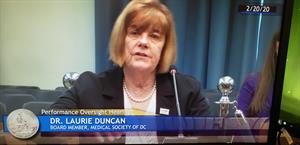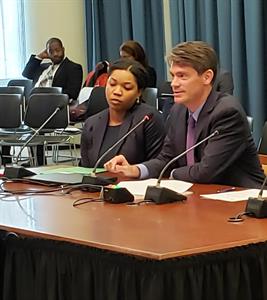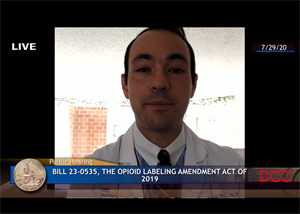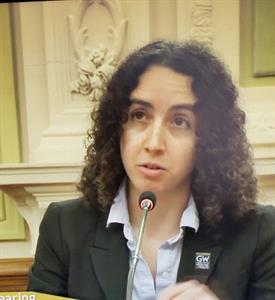
How to Testify Before the District Council January 28, 2021
Written by Robert Hay Jr.
This article is the first in a series of advocacy advice articles that are part of MSDC's Advocacy Curriculum. If you have thoughts on future topics, please contact Robert Hay Jr. at hay [at] msdc.org.
The idea of sitting before a committee and testifying on legislation can be terrifying. Even for the most accomplished scholar or medical professional, the thought of being grilled by a lawmaker on the topic can be enough to dissuade a physician from raising their hand to speak at a Council hearing. However, the benefit to you and your cause to speaking at a hearing is invaluable, and worth the time and energy.
 Before proceeding, it is important to note that the public health emergency has changed how people can testify on legislation. While many of the basics are the same, we will note in this article where virtual v. in-person testifying differ. Moving forward, we are unsure if virtual testimony will still be an option but as with everything advocacy will adjust.
Before proceeding, it is important to note that the public health emergency has changed how people can testify on legislation. While many of the basics are the same, we will note in this article where virtual v. in-person testifying differ. Moving forward, we are unsure if virtual testimony will still be an option but as with everything advocacy will adjust.
The first, most important thing to know about testifying on an issue is when the hearing on the bill will be. The DC Council has an informative website and hearing notices usually contain deadlines to send in information to testify. You can submit written or verbal testimony, but the latter is much more effective than the former. If all else fails, keep in touch with MSDC to find out when hearings of interest come up.
 Prior to the hearing, you will need to compose a written statement. This is used for the official hearing record, so double check your spelling! The written statement can be an outline of your talking points or a more in-depth document used to provide supplemental information on your argument. The hearing notice will give you guidance on when and how written testimony should be submitted prior to the hearing.
Prior to the hearing, you will need to compose a written statement. This is used for the official hearing record, so double check your spelling! The written statement can be an outline of your talking points or a more in-depth document used to provide supplemental information on your argument. The hearing notice will give you guidance on when and how written testimony should be submitted prior to the hearing.
MSDC Written Testimony Example
At the hearing itself, you are allowed to bring notes and talking point documents with you to use as you testify. However, depending on the issue, it may be better to speak extemporaneously to give a more personal feel to your testimony. However, use whichever style will help you get your point across - you will not lose a legislator if you need to read your statement.
So the day of the hearing is here. For an in-person hearing, we encourage those testifying to arrive before the hearing begins if possible. If it will be a long hearing or a hearing covering many bills, check with MSDC staff or even Council staff to get a sense of when your turn will come up in the schedule. MSDC witnesses will usually have an MSDC staff person there to provide updates on when their turn is approaching. Also, you can request a witness list prior to the hearing but keep in mind it may change the day of the hearing.
 For online testimony, the experience is similar but much more convenient. You can log-in to the livestreaming site and go about your work. Depending on the committee, a staff person will send you a message 20 minutes or so prior to your turn to testify. Once your turn comes up, staff will turn on your camera and mic, and you can begin speaking.
For online testimony, the experience is similar but much more convenient. You can log-in to the livestreaming site and go about your work. Depending on the committee, a staff person will send you a message 20 minutes or so prior to your turn to testify. Once your turn comes up, staff will turn on your camera and mic, and you can begin speaking.
The Council arranges testimony in panels, usually of four people at a time. Each person delivers testimony, and the Chair and committee members ask questions of the panelists. Depending on the topic and time, you may receive questions or not. It is OK to say you don't have an answer to a question but can get one. Also, it is ok to be friendly. If the Chair or a committee member wants to say hello and ask how you are doing, feel free to say hello back!
 Every hearing has a time limit for testimony. It is usually between 3 and 5 minutes. Please stay within that time. Depending on the topic and number of people testifying, the Chair may be strict with your time or a little looser, but out of respect plan on testifying within your time limit.
Every hearing has a time limit for testimony. It is usually between 3 and 5 minutes. Please stay within that time. Depending on the topic and number of people testifying, the Chair may be strict with your time or a little looser, but out of respect plan on testifying within your time limit.
Finally, have fun! Not only do you get to be an expert you may influence the fate of the bills on which you are testifying. I have heard stories of physicians testifying on a bill and because they were the only public witness, and they did a great job testifying, a bill moved out of committee. In the District Council, with its smaller size, your voice can have an oversized impact.
Good examples of how to testify:
- Dr. Laurie Duncan on physician health during a performance oversight hearing (2 hr:10min mark)
- Drs. Sam Kareff and Yavar Moghimi testifying on a number of bills (for and against) online
